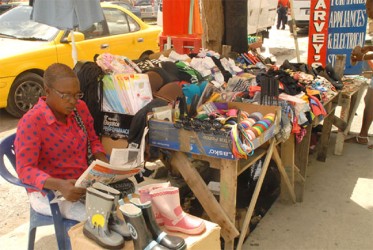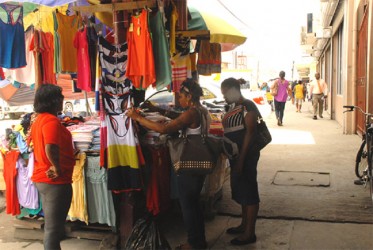If you walk down Regent Street or Water Street these days, you would think that there had never been a clampdown on street vending. The vendors are there in vast numbers and if the municipality is planning to clear the pavements again anytime soon it will not be easy.
Apart from what they seem to believe is their moral right to trade on the streets, the vendors have come to resemble part of the commercial landscape anyway. They appear to belong alongside the traditional high street traders many of whom have been there for decades. It’s a kind of living along arrangement that acknowledges that everyone has to make a dollar.
The tenacity of the vendors has worn the municipality down. That is hardly surprising. There is a lot at stake for the vendors, who are mostly female and mostly undereducated. Most of the ten or so vendors who agreed to talk about the subject said that they were not yet 40 and that they had school-age children. More than half of them are single parents and none of them appeared able to think of an option to pavement vending.

None of them sounded daunted about the future and though all of them had left school without any particular academic qualification, their primary mission appears to be to get their children the best education they can afford.
When you ask them about how they are getting on in business they complain very little. You get a kind of ‘some days good, some days not’ response. They talk about what they say is “an understanding” that now exists with the City Police. No details are provided but you get the impression that the understanding works for both sides. Another ‘understanding’ of a different kind exists with the traditional high street traders. That is how the two sets of businesses are able to exist side by side with each other.
The vendors talk about the Chinese businesses too. It’s not all bad, they say. Much of what they sell comes from the Chinese traders anyway and in some instances relationships are being built between the local vending community and the Chinese merchants.
Our pavement vendors have a limited range of business interests. They are concerned about getting goods on credit and at competitive prices; about flooding in the city and about making enough money to feed their children and to ensure that they attend school. They also concern themselves with important trading days – periods that precede major holidays – and public sector pay dates. Issues like the national budget and the commercial banks’ interest rates are not matters of particular concern to them. The simple truth is that they do not connect those issues to their personal fortunes.
Business on the streets has a pattern of its own. There are several ‘box hands’ going on amongst the vendors. These are highly organized and appear to proceed mostly without controversy. There is a vendor on Regent Street who manages several ‘box hands.’ Her job is to ensure that the monies pass from hand to hand in a timely manner.

She collects and distributes, pocketing a small commission for herself. Our ‘box hand’ manager has several ‘hands’ in the boxes that she manages, including one that yields $100,000 every fortnight.
These lump sums help to grease the wheels of the vending business. The amounts are used to pay for goods credited from wholesalers or to invest in some other business pursuit. Once you commit to a ‘box hand’ you essentially enter into a hustle to meet the payments.
‘Box hands’ are options to commercial bank borrowing to which the vendors rarely if ever have access.
The vendors who have graduated from the streets and now occupy stalls in one shopping arcade or another, have not, in many cases, been able to put the streets behind them. The problem appears to be that while arcades are seen as a step up from the streets they have still not attracted the numbers of customers that create a sufficiently brisk trading environment. Some Water Street vendors, for example, still take items onto the streets. They either trade from both places, or else, they use their stalls in the arcade as a storage bond. As long as the streets remain more attractive as a marketplace, arcades are not likely to be successful.
Over time, it appears that pedestrians have grown used to the major congestion that results from pavement vending. Perhaps oddly enough there appears to be a greater public tolerance of pavement vending these days. It appears that the facility of being able to stop on the pavement to make small purchases – like a few pairs of socks or a few pieces of children’s underwear – is still something that many people prefer.





